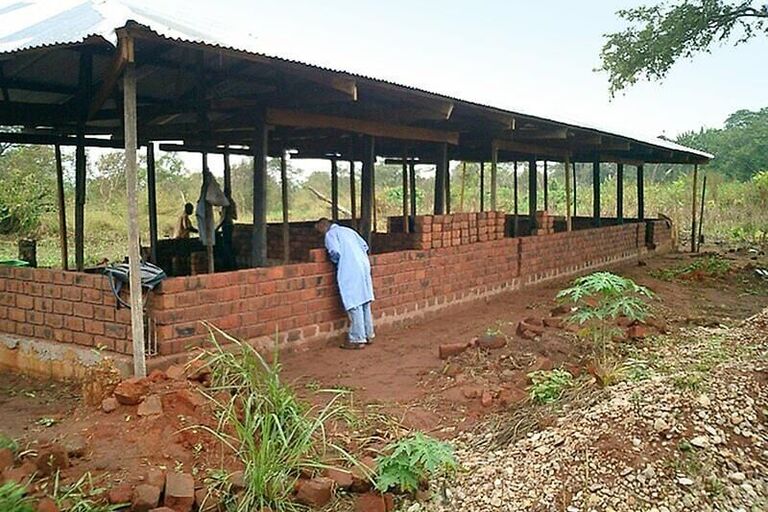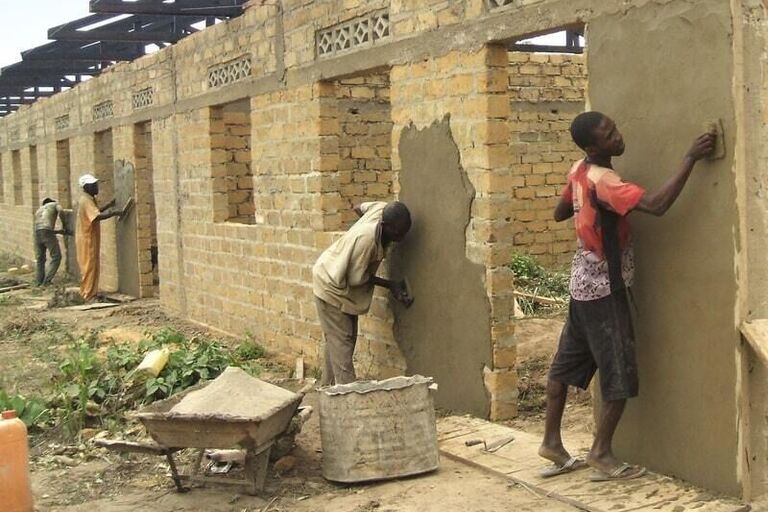Helping those in need is a natural expression of love. Interview with a missionary worker
Lenka Schmidt was born in Prague. At the age of sixteen, she experienced the Velvet Revolution, after which unforeseen possibilities opened up. She started studying psychology in the desire to help people. She experienced God's love "first hand" and soon after felt the call to become a missionary...

She helped in orphanages, camps for teenagers following the war in Bosnia, as a medical assistant in the African bush. With her husband Wolfgang, who is from Mainz, Germany, she spent ten years in Africa. In 2008, they adopted a new-born named Anisska in the Democratic Republic of Congo. Lenka now lives with her family in the Czech Republic, from where she and her husband manage school projects in Congo.
You chose to help children in Africa as a response to God’s love. How did you come up with this idea?
We’re a little crazy, me and my husband. We kept moving to places where more and more help was needed. We always say that the first step is from Europe to Africa, the next step is to Congo, and the next into the bush… When we were in Zambia, working on corn distribution in the East of the country, which was severely affected by floods, we could see that they had already set up a mall business centre and things were starting to work well. So we moved on, further into Africa.
You spent many years in the Congo, working for the German humanitarian organisation Aktive Direkt Hilfe (Active Direct Aid), which built two schools and a health centre there. It is probably difficult to summarise this whole period in a few sentences, but nevertheless: what was the most difficult and the most joyful part?
Honestly - after arriving in Africa, I felt like going back again after a fortnight. Everything is so different there! Even though I thought I was ready for it, it turned out I really wasn’t. But thanks to the encouragement from the others on the team, and above all thanks to God's love and grace, I made it through and had a very exciting time. Most volunteers last about two years, because life in Africa really is tough. In the Congo, you never know when there will be electricity, running water, there is always something that is not working; it's a constant struggle. Since we were not exactly rich, I never lived in a home with air conditioning in ten years. On the other hand, when you really struggle to make it through, the victories are truly worth it. I think what I found the most challenging was to start from scratch in a new African country each time we moved. We would arrive with a couple of suitcases and a little bit of money to a new country in which we often didn’t know anybody. Not only did we have to find out where help was needed, but we also had to find a way to survive ourselves. But God’s love never failed us. It was amazing to watch how He would find us a place to stay, food, everything we needed. And not only for us but also for anyone we would try to help.
You and your husband are raising a daughter you adopted from a Congolese orphanage. What does this life experience mean to you?
It’s wonderful, Anisska is amazing! It was an unexpected decision. At first, it looked like we would have to wait half a year. But then, ten days after our visit to the orphanage, the phone rang and we got a call from a lady from the orphanage. She said they had a new-born baby and asked if we wanted it. We went to have a look at the little girl, she was just two days old. When she was a week old, they asked us to take her home, at least temporarily, because they did not have enough money to provide milk, clothing, and diapers. It then took about another eight months to finish all the complicated paperwork. Everything was suddenly going so fast and we were not physically prepared. Another miracle was that about two weeks prior, the Belgian ambassador’s secretary had given us a box of baby clothes. Someone even gave us an African crib with a mosquito net. Then visitors arrived from Germany with more things, my parents and family also sent a huge package through a colleague. However, we soon learned that given the frequent water and electricity outages and one washing machine for eight volunteers, we could not manage with cloth diapers and hand washing. Then a local sponsor from Lebanon gave us disposable diapers, for which we were very grateful.
Are people in the Congo different from our (European) idea of what they are like?
Completely! African culture is so different that you really need a large amount of time to get to understand at least some of it. The big advantage of the local people is that they are naturally very spiritual. Both in the positive and in the negative sense of the word. Faith in God is a natural part of their lives. In the Congo, as well as in other countries, you will find churches on every corner. Basically, every time you go out to do something, you will meet several people who are happy to pray with you and accept Jesus. A lot of them want Bibles and Christian literature. They have a lot of respect for missionaries.
In Africa you also found yourself in the middle of a war conflict, one of the schools was affected by fighting between local tribes and three quarters of the town's inhabitants had to flee their homes. We can now understand these events better, given the war in Ukraine. How did you cope with this situation at the time?
The saddest part is that the vast majority of the conflicts results from the interests of “developed countries”. Isn’t it interesting that the fights always take place in locations where lots of mineral resources can be found, like in the Congo? Here, you’ll find the largest deposits of coltan and cobalt, which are needed for phones, computers, and car batteries. You’ll also find deposits of diamonds, gold, copper, etc. Since the vast majority of the population is poor, who has the means to access and mine the resources? And at what cost! We have also seen a coup and shootings in the streets. We even had a very close-up experience: we found a bullet casing in the garden. But God's protection is amazing and none of us were hurt.
You started over in a new place and built another school. How did that work out?
Thanks to Gilbert, a member of our Congolese organization, we discovered another place far away from civilization. Gilbert was one of the top executives of Vodacom, a foreign telephone company, and had been helping us for a long time. Thanks to him, we were able to make free phone calls for years, and the company even gave us a car. In the bush, where Gilbert originally came from, children had no practical education or jobs after primary school. That's why we built an agro-pastoral school for them in Mabala (500 km from the capital). We are still paying the teachers' salaries, we have built a well for them and we are gradually completing school buildings for the higher grades, as needed.
Where do you draw new strength to help those in need?
From God and from His Word! Every morning, my husband and I spend an hour or so reading the Bible and praying. We all have our limits, but God can take us far beyond our own capabilities, which is sometimes quite amusing to watch. I would never have found the courage to travel to Africa and spend ten years living there, if it had only been up to me.
What do you consider the most important in your life?
I love Jesus very much. I think the most important thing is to make Him happy and help others to find Him, that is my life’s priority. If only people had any idea how much God loves them and how much he can help them… To me, it feels like life with navigation versus life without it. It’s possible to live without it, but if you’re smart, you use it.
I will also never cease to be fascinated by how prayer actually works. I grew up in a totally unbelieving family and in the beginning, when I would "test" God to see if He was “working”, I would ask for something and He would answer. I attributed it to chance. But then the coincidences got too frequent and things started happening in my life and in the lives of my loved ones that I was absolutely sure were not coincidences. Our loved ones know that we have a place on our bathroom floor tiles where we write prayer requests with a marker from all those who need it. When a prayer is answered, we erase it and write a new one. We do this with joy; it is wonderful to watch how God finds a solution every time.
Daniela Ženatá (editorially abridged)

